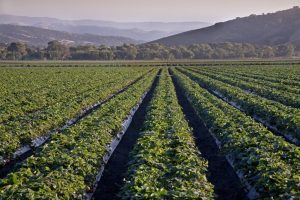UC Davis will be working with advanced.farm to evaluate the performance of different strawberry cultivars using robotic harvesting. The goal is to identify varieties that show potential for being planted in robotic harvesting systems. Strawberry Licensing Field Representative for the UC Davis Strawberry Breeding Program, Isaac Rainwater said they have been in talks with advanced.farm for more than a year, discussing the potential for collaboration.
“A lot of the issues they’re having is with the plant characteristics that are currently in the industry: finding exposed fruit and getting the robots in to harvest the fruit has been a challenge,” Rainwater explained. “So, [advanced.farm] came to us in the breeding program and said ‘hey, what do you guys have that might help us with our harvesters? Are there any varieties available or in the pipeline that would be conducive for robotic harvesting?’”
The plants that will be used in the project are currently in nurseries in Northern California. After harvesting them sometime in the fall, they will be planted in Oxnard and Santa Maria. “We’ll start getting the first fruits off in December and then the season will run December through mid-April or so. That will be upcoming next Spring, we’ll have some good data coming out of it,” said Rainwater.
The project will include both released and unreleased varieties. Data collected from the trials will help to guide further strawberry cultivar research. As labor becomes even more of a challenge, the strawberry industry is anxious for the continued development of viable robotic technologies. Collaborations like the one between UC Davis and advanced.farm are vital for advancing the prospects for robotic harvesting in strawberries.
“It is going to be super helpful for [the breeders]. So when they make their selections in the breeding process they can pick and choose certain traits that will be helpful for the robotic guys,” Rainwater noted. “If there are other robotic harvesting groups out there that are interested in doing something similar, they can contact us and we can see what we can do.”











